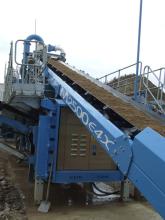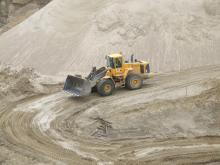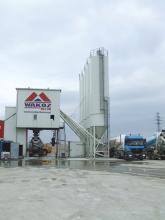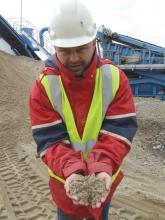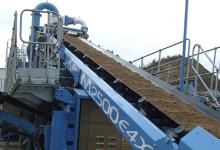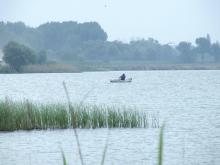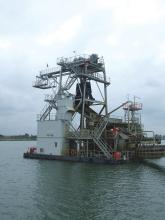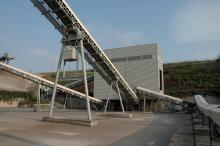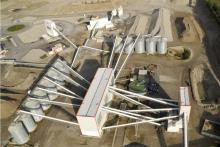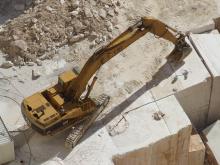
Wakoz's newest quarry is producing top quality aggregates for major road construction work in Gdansk following investment in washing facilities. Claire Symes visited the quarry in Poland to find out more
Visitors arriving at
Although the site only opened in 2006, Wakoz Beton has recently been investing in facilities at the quarry in order to improve production to meet its parent company's specification demands. Installation of a CDE mobile washing plant at the site last year means that the quarry is providing essential materials for concrete being used to construct the S7 southern ring road in nearby Gdansk.
The quarry is located 30km west of Gdansk and Wakoz's distinctive blue on-highway dump trucks - known locally as Smurfs - transport the material from the quarry to the company's network of six ready mixed concrete plants located strategically around the city.
Deposit
Quarrying has been carried out in the Glazica area since the 1970s when operations were undertaken by the government-owned
"The current quarry was a greenfield site in 2006 and the company faced no local opposition to the opening of a new pit due to the location of other quarries in the area," explained Wakoz Beton head of production Mariusz Michalek. "The challenges that we faced were more environmental based - the quarry boundary lies just within the Natura 2000 Trojmiejski Park Krajobrazowy."
According to Michalek, this proximity placed limitations on the quarry in terms of noise and dust and as a result the quarry operates two shifts between 6am and 10pm.
The company has permission to extract from a 7ha area but the deposit - known in Polish as an oz - is very long, deep and narrow so the size of the quarry belies the size of the deposit. It is the largest sand and gravel deposit of its type in Northern Poland.
The company's consented reserves at the site is around 2million tonnes but the consent only extends to 40m below ground level while the deposit runs to 70 to 80m below ground level, possibly further. The quarry currently extracts 150,000 to 300,000tonnes per year depending on demand and Michalek estimates that the quarry has enough reserves to last the next 25 years at current rates of extraction.
"Material at the top is generally in the 0 to 2mm size range but increases to 6mm nearer the bottom," said Michalek. It was this grading that led Wakoz to invest in washing equipment in order to produce high quality clean sand that could meet the tightest of concrete specifications.
Extraction
Material is excavated by wheeled loader or excavator and screened before it is washed by the recently installed CDE M2500 mobile washing plant, which replaced an Evowash system at the site. The plant was installed at the site in September last year and is close to paying for itself in terms of improved quality of the material, according to Michalek.
The quarry employs just five people across both shifts - two working in production and one person in the on-site office. Michalek said extra people are drafted in from other Wakoz sites as necessary.
Due to the constraints of the deposit, space is at a premium within the site but the other limitation - which was an important consideration when it came to selecting the washing equipment - is the lack of available water.
"The main issue here is the lack of water," explained Michalek. "There is no water within the deposit and there is now room to store water on site so until no washing the material was not an option so we just dry screened it.
"The material is very high in quality but there is a high sand volume - up to 80% in some parts, although it is mostly around 60% - and this limited the production."
Before the M2500 was commissioned, the site's sand contained 3% dust but now it has less that 0.2%. "This makes it ideal for high quality ready mixed concrete production," said Michalek.
Wakoz selected the CDE washing and water recycling plant because of the low water consumption. "We looked at a lot of other options but plants that offered similar levels of production needed 150m3 of water per hour, but the CDE plant needed just 13m3 per hour when in operation," said Michalek. "This was possible due to the use of a thickener plant alongside the washing plant but neither take up much room and this was a key consideration on a site with such limited space.
"It will pay for itself in 14 to 15 months."
Another way that the new plant is benefiting Wakoz is in terms of power - the M2500 is electrically powered, which not only makes it quiet but also more cost effective to operate. "There are no commercial discounts on diesel in Poland and we are currently paying €1 per litre for fuel for the wheeled loaders," said Michalek. "The diesel for the two machines on site probably accounts for 15-20% of the running costs."
The M2500 is a mobile unit that can be relocated within the Glazica site as work progresses and can be assembled within 48 hours. The EX4 version of the plant at Glazica allows the quarry to wash and accurately size four products - two sands and two aggregates - simultaneously at a rate of up to 120tonnes per hour.
Wastewater from the washing plant is fed into the CDE AquaCycle A400, which removes the need for settlement lagoons to recover water - this was an essential element for Wakoz given the space constraints. According to CDE, the fully automated AquaCycle thickener can recover up to 80% of the water needed for the washing processes.
Safety
The quarry is using deep mining methods and operates at three levels simultaneously with slope angles of 65 to 70% in active areas and an 8m bench height, which has been designed to ensure safety. "When we come to restore the site, the slope angles will be reduced to 17 to 30% but due to the layout of the site, restoration will not start until the quarry is nearing the end of its life," said Michalek.
He added that health and safety is a very important issue for Wakoz and the effort to ensure this was continued at Glazica involved a few key factors - use of modern machinery and employment of qualified and experienced staff.
"Employees of the plant are systematically trained to meet both external and internal standards," he said. "Operation of the deposit is also under the constant supervision of the Management and Mining Authority. Machines used at the plant are very modern, with all the security in accordance with EU standards, such as bridges, rails, safety switches, alarm sound and lights. Everyone working in the quarry is also required to use PPE."
Investment
Although the site is very quiet, even when in full production with just five people working across both shifts, the arrival of the washing plant has increased productivity. So much so that the quarry is currently awaiting delivery of another wheeled loader - a
Michalek said that the other issue is the time involved in gaining new consents. "In Poland, the process of increasing resources potential for exploitation is an arduous and lengthy one," he said. "It is associated with a fairly complicated procedure and a very large environmental restriction. However, one of the main objectives of the Wakoz's strategy is to expand the resource base and at this deposit, this will take the form of deepening the exploration."
Although the current consent at the Glazica site only extends to 40m below ground level, Michalek is confident that the deposit may well extend to twice that depth and he hopes the company will be able to gain consent to access this in the future. Such a move will secure the future of high quality sand and gravel for the Gdansk construction market for many years to come.
Company History
Wakoz was started in 1992 as a road construction company by the Wicki family and the business is still family-owned today. The company now employs 1000 people in Poland and ahs four main bases in the country.
The parent company is run by Jacek Wicki, the son of the founder Edmund Wicki, who is still involved in the day to day running of the business. The quarry operation comes under the umbrella of Wakoz Beton, which is run by Edmund's other son Irenusz Wicki
Wakoz Beton has five sand and gravel quarries and one hard rock quarry in Poland producing 2 million tonnes of aggregates each year - 25% of which come from the hard rock quarry. The company also produces 400,000m3 of ready mixed concrete per year.

